-
 Art of Wellness Acupuncture & Traditional Chinese Medicine (TCM)11704 Wilshire Blvd, Suite 295, Los Angeles, CA, 90025
Art of Wellness Acupuncture & Traditional Chinese Medicine (TCM)11704 Wilshire Blvd, Suite 295, Los Angeles, CA, 90025
myartofwellness@gmail.com310-451-5522 Office Hours
MonClosedTue7:30 am --4 pmWed7:30 am --4 pmThu7:30 am -- 4 pmFri7:30 am -- 4 pmSat7:30 am -- 4 pmSunClosedOur office opens from Tuesdays to Saturdays 7:30 am to 4 pm, will be closed on Memorial day, Independent day, Labor day, Thanksgiving day, Christmas and New year.
-
Recent Posts
- How to Treat Rosacea With Acupuncture and TCM
- How to Treat Perioral Dermatitis With Acupuncture and TCM
- Lymphatic Drainage With Acupuncture and TCM
- How to Treat Turf Toe With Acupuncture
- How to Treat Nerve Pain With Acupuncture and TCM
- How to Treat Watery Eyes With Acupuncture and TCM
- How to Treat Ovarian Cysts With Acupuncture and TCM
- How to Treat Dystonia With Acupuncture and TCM
- Can Acupuncture Help Bad Breath?
- How to Treat Atopy with Acupuncture and TCM
- Plantar Fasciosis Treatment With Acupuncture and TCM
- How to Protect Yourself When Air Quality Is Poor
- How to Treat Spinal Headache With Acupuncture and TCM
- How to Treat Sarcoidosis With Acupuncture and TCM
- How to Treat Flu With Acupuncture and TCM
- Chinese New Year 2025 Year of the Snake
- Sign up to receive news and updates and get my free report:“The Top 10 Reasons to Try Acupuncture”

July 2025 M T W T F S S 1 2 3 4 5 6 7 8 9 10 11 12 13 14 15 16 17 18 19 20 21 22 23 24 25 26 27 28 29 30 31
Immune System
How to Treat Hay Fever With Acupuncture and TCM
By Qineng Tan, L.Ac. Ph.D. & Xiaomei Cai, L.Ac., Ph.D.

Itchy eyes, runny nose and sneezing? These are some of the classic seasonal allergy symptoms, also known as allergic rhinitis, or hay fever. Acupuncture and TCM herbs can help relieve allergies, including pollen allergy symptoms.
Seasonal allergies affect about 20% of Americans. Allergic rhinitis is an immune system reaction to an allergen in the air that can be inhaled, like pollen from budding trees, growing grass, and plants like ragweed. Hay fever is a common term that typically describes being allergic to pollen.
“Pollen” are tiny seeds from plants that can be carried by the wind. When there is lots of pollen in the air, this is called a high pollen count. You can check the pollen count, like a weather report, to see when it is particularly high, and thus may affect people who suffer from seasonal allergies and asthma.
While having an allergic reaction to common airborne allergens happens most often during the spring, summer, and early fall, when plants are giving off a lot of pollen, people can actually experience hay fever at any time of the year.
Similar allergy symptoms can occur due to exposure to dust mites, molds, and pet dander.
Acupuncture and TCM can help relieve the irritating symptoms caused by allergic reactions by helping to strengthen and balance the immune system so that it is not so easily triggered.
Top 10 Seasonal Allergy Symptoms

The body’s histamine response causes inflammation of the mucus membranes in the sinuses and throat. The increased mucus production occurs in order to drive out the offending allergens.
Pollen allergy symptoms are similar to those of the common cold. Signs of hay fever include:
- Sneezing
- Nasal congestion
- Runny nose, itchy nose
- Itchy eyes, watery eyes (allergic conjunctivitis)
- Itchy throat
- Postnasal drip
- Headaches, sinus pain
- Dark circles under eyes, puffy eyes, “allergic shiners”
- Fatigue, malaise, generally feeling under the weather
- Wheezing, coughing, trouble breathing
Skin rash is a less common symptom of seasonal allergies, but some people do develop a hay fever rash. The itchy allergy rash may look similar to hives: raised red welts on the skin.
Treatment for Hay Fever
The common medical treatment for hay fever is an antihistamine. Histamines are chemicals that occur naturally in the body as part of the immune response to allergens in the environment. The release of histamines is what leads to allergy symptoms like a runny nose and itchy eyes.
Antihistamines come in pill or spray form, and they block the histamine response, which can temporarily relieve the hay fever symptoms. However, these medications do have side effects, the most common of which is drowsiness.
If someone is not getting relief from antihistamines, then corticosteroids, or steroids, may be prescribed. These work as anti-inflammatories, which in this case means that they reduce the swelling of mucous membranes. Steroids, too, can have significant side effects, especially when used over a long period of time.
Nasal sprays for allergies, like Flonase or Mucinex, are decongestants that are designed to be sprayed into the nose to help reduce allergy runny nose. Again, these may provide some temporary relief, but people can quickly get used to them, so they stop being effective.
Acupuncture and TCM offer an alternative treatment for allergies that can help relieve hay fever symptoms without side effects.
Can Acupuncture Help Hay Fever?

According to TCM theory, allergies fall under the category of illnesses that are caused by “wind” as a pathogenic force that can invade the body. In the TCM view, hay fever occurs due to wind-heat getting into the lungs.
Weakness of the kidneys and spleen can also contribute to hay fever; when they are sluggish, mucus tends to build up, and we become more easily fatigued.
When the defensive Qi is strong, it can protect us from cold, heat, wind, and dampness getting into the body and causing problems. Defensive Qi is roughly analogous to what we think of as the immune system in conventional medicine.
TCM treatment for allergic rhinitis may include acupuncture, herbal supplements, moxibustion, and nutrition counseling. TCM can be used either as an alternative therapy for allergies, or as an adjunct treatment for hay fever, along with pharmacological treatment.
Chinese herbs have been used for many centuries to treat allergy symptoms. Now, we are able to see scientific evidence that these herbs, such as astragalus, magnolia flower, and licorice root, do actually have an effect on the immune response and histamine function by helping to regulate the production of chemicals like cytotoxic T-cells and immunoglobulin G. Compounds found in scutellaria root have been found to inhibit the production of inflammatory cytokines, and stephania root can help prevent anaphylaxis.
With Chinese herbal medicine, we are able to create customized formulas for each patient, depending on their particular presentation of symptoms.
Acupuncture is a highly effective modality for all types of allergies, from allergic rhinitis to atopic dermatitis or eczema, and can help relieve the nasal sinus symptoms that affect the eyes, nose and mouth if someone is allergic to pollen. It can also help reduce itching due to allergic skin rashes.
A clinical trial conducted at a hospital in China showed that a regimen of acupuncture and herbs resulted in over 90% of patients reporting that their nasal symptoms were greatly reduced.
Another published study showed that acupuncture reduced levels of Immunoglobulin-E, an antibody that is associated with allergy responses.
A review of studies of acupuncture for allergic rhinitis showed that this treatment has both short-term and long-term efficacy.
TCM treatment for seasonal allergies allows us to get to the root cause of allergy symptoms and help prevent them from happening. In this way, acupuncture and herbs can function as preventive medicine for hay fever. Getting acupuncture periodically throughout the year can help you avoid allergy attacks when the pollen count is high.
Top 3 Tips for Hay Fever Prevention
Here are some things you can do to help prevent spring hay fever and relieve pollen allergy symptoms:
- Avoid dairy food and cold foods, which promote more mucus production.
- Apply warm compresses to the face to soothe the eyes and nasal area.
- Use an air purifier in your home to keep allergens out of the environment.
To relieve allergies, emphasize more cooked foods that help warm the body.
Acupuncture Near Me for Hay Fever in Los Angeles Area, Santa Monica
The multifaceted approach of TCM makes it uniquely suited to help relieve seasonal allergy symptoms. Acupuncture can help reduce hay fever symptoms right away and help prevent allergies from knocking you down every time the pollen count is high. Please do not hesitate to seek relief from hay fever by giving acupuncture and herbs a try.
*This article is for education from the perspective of Traditional Chinese Medicine only. The education provided by this article is not approved by FDA to diagnose, prevent, treat and cure human diseases. It should not stop you from consulting with your physician for your medical conditions. Traditional Chinese Medicine is based on Qi, which is an invisible force that usually cannot be observed by modern science. Because science focuses on testing ideas about the natural world with evidence obtained through observation, these aspects of acupuncture can’t be studied by science. Therefore acupuncture and Chinese herbs are often not supported by double-blind, randomized trials, and they are considered alternative medicine therapies in the United States.
How to Treat Diarrhea With Acupuncture and TCM
By Qineng Tan, L.Ac., Ph.D. & Xiaomei Cai, L.Ac., Ph.D.

Chronic diarrhea, explosive diarrhea, diarrhea after eating? Diarrhea may be related to IBS (irritable bowel syndrome), or an IBD (inflammatory bowel disease), or a reaction to a food allergy, parasites, or stress. Acupuncture and TCM offer an alternative diarrhea treatment, so you can get relief from stomach pain and diarrhea.
Why Do I Have Diarrhea?
There can be many different causes of diarrhea, also known as loose stool. Acute diarrhea, which only lasts one or two days, will usually go away on its own.
Watery diarrhea that lasts a few days is usually due to food poisoning. Eating something that was rotten, or not cooked properly to destroy bacteria, can cause vomiting and diarrhea. Watery diarrhea can also happen when you have some type of viral infection, such as the “stomach flu.”
Chronic diarrhea, or persistent diarrhea, which lasts for weeks, or bouts of diarrhea that come and go frequently, may be related to IBS symptoms, IBD symptoms, Celiac disease, SIBO, or some other problem.
More than 6% of adults in the U.S. report having chronic diarrhea. Chronic diarrhea in children is also a serious health concern worldwide.
Top 10 Causes of Diarrhea
Diarrhea is a common condition that everyone experiences sometimes. Usually it is temporary, but it can become persistent and serious enough to require diarrhea treatment. The most common reasons a person experiences loose bowel movements include:
- Bacterial infection, traveler’s diarrhea, food poisoning, unsafe drinking water
- Viral infection, such as rotavirus, viral gastroenteritis, stomach flu
- Parasite infection, such as giardiasis
- Food allergy, food intolerance, food sensitivity, Celiac disease
- Reaction to medications like antibiotics, antidepressants, or Metformin
- Reaction to radiation therapy, cancer treatment
- IBS – diarrhea, constipation, and stomach cramps are common IBS symptoms
- IBD – colitis or Crohn’s disease, inflammatory autoimmune disorders that affect the gut
- Malabsorption of food, poor absorption of nutrients
- Menstrual cycle or Perimenopause – changes in hormones/estrogen can cause diarrhea
Certain foods can cause diarrhea, including: too much coffee, artificial sweeteners like mannitol and sorbitol, and red food coloring. Magnesium supplements can also cause loose stools.
If diarrhea lasts more than a few days, it is important to seek healthcare advice. Chronic diarrhea can lead to dehydration and fatigue, and may be happening because of some more serious condition that needs to be addressed.
What Causes Chronic Diarrhea?

Bouts of diarrhea that keep recurring can be a symptom of disorders such as:
- IBD (inflammatory bowel disease) – the most common IBDs are ulcerative colitis and Crohn’s disease. IBD symptoms usually include bloody diarrhea and abdominal pain. IBDs can cause chronic or recurring diarrhea, which can lead to dehydration, fatigue, and weight loss. IBDs can be mild, or so serious that they cause long-lasting damage to the gastrointestinal tract.
- Ulcerative colitis – an autoimmune disorder that causes inflammation and ulcers, or open sores, in the lower gastrointestinal system, including the colon and rectum.
- Crohn’s disease – an autoimmune disorder that causes inflammation mainly in the small intestine, but can affect any part of the GI tract.
- IBS – Irritable bowel syndrome can seem similar to IBDs, also causing recurring bouts of diarrhea and stomach pain. However, IBS is considered a functional gastrointestinal disorder. It is quite common. People with IBS symptoms may have alternating bouts of diarrhea and constipation. People who tend to have more diarrhea-dominant IBS have “IBS-D.”
- Celiac disease – an autoimmune disorder in which a reaction to eating wheat gluten causes serious inflammation of the GI system, leading to abdominal pain, bloated stomach, diarrhea, malnutrition, fatigue, and skin rashes.
With these conditions, diarrhea is brought on periodically—sometimes alternating with constipation, as in some cases of IBS—by factors having to do with the diet or stress, or with autoimmune processes.
Some surgeries that affect the gastrointestinal organs—like gastric bypass, gastric sleeve, or gallbladder removal—can cause chronic diarrhea.
Chronic diarrhea can be caused by an inability of the intestinal walls to absorb nutrients, and/or of the walls of the colon to absorb liquid. It may also be due to excessive action of the intestine in terms of peristalsis, the squeezing of the intestine to move matter through.
Diarrhea Treatment
Acute diarrhea usually goes away on its own in a day or two. Often, people will use OTC remedies for diarrhea and stomach pain, such as Immodium or Pepto-Bismol.
If you have been experiencing persistent diarrhea and seek medical advice, a doctor will perform tests to figure out what is causing the diarrhea, and will offer electrolyte fluids to help with dehydration. Blood tests or a stool test will show if the diarrhea is due to a bacterial infection or parasitic infection.
If chronic diarrhea is determined to be related to a medication you are already taking, then that may need to be adjusted.
Discovery of IBS or an IBD usually involves more diagnostic testing, including a colonoscopy and/or endoscopy, to see if there is inflammation or blockage in the GI tract.
Medical treatment for IBS may involve being offered antispasmodic medications that relax the intestinal walls and slow down the movement of the bowels and can help relieve stomach cramps and abdominal cramping. Dietary changes and behavioral therapy may be recommended.
Pharmacological treatment for IBDs like colitis and Crohn’s usually involves taking a combination of anti-inflammatories and immunosuppressants, to reduce inflammation in the gut and to block the inappropriate autoimmune responses that are triggering the inflammation. Unfortunately, steroids and medications like Xeljanz can cause other side effects and health problems.
Medical treatment for chronic diarrhea may help relieve symptoms and reduce the frequency of bouts of diarrhea, but it does not necessarily address the underlying causes of diarrhea.
Acupuncture and TCM offer an effective alternative treatment for diarrhea that is more suited to each patient’s individual situation.
Can Acupuncture Help Diarrhea?
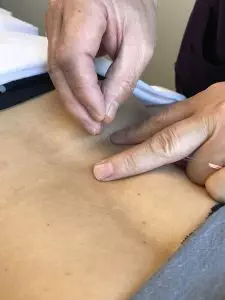
Chronic diarrhea, according to TCM theory, is usually considered to be related to the health of the spleen. In TCM, the organ systems all interact harmoniously, unless there is imbalance. The imbalance of one organ system may throw off other systems, leading to various symptoms.
In TCM, the spleen is responsible for breaking down the nutrients from food and converting them into energy. If the spleen is not functioning properly, watery stool is often the result. Diarrhea, stomach pain, and other symptoms may differ from person to person, depending on how the spleen is interacting with the liver, stomach, or kidneys.
Common Chinese Medicine diagnosis patterns for chronic diarrhea include:
- Spleen Deficiency with Liver Qi stagnation: mucus in the stool, abdominal pain, cramping, gassiness, bloated stomach, irritability, and feelings of depression
- Spleen Deficiency with Stomach deficiency: watery stools, poor appetite, feeling full quickly, stomach distended after eating, pallor, and fatigue
- Spleen Deficiency with Kidney Deficiency: diarrhea in the morning, partially digested food in the stool, abdominal pain, lower back pain, knee pain, feeling cold
Acupuncture treatment for diarrhea, which may include moxibustion and herbs, aims to support the health of the spleen and other organs. Acupuncture has been shown to help relieve diarrhea and constipation related to IBS. Acupuncture treatment can also help with reducing stress and anxiety, which are common triggers for IBS symptoms.
Acupuncture can also help with diarrhea due to IBDs like ulcerative colitis and Crohn’s disease by reducing inflammation and helping to balance immune responses. TCM treatment for Crohn’s disease or colitis, incorporating nutrition and herbal supplements, can help improve the gut biome and strengthen the lining of the intestinal walls.
Acupuncture for Diarrhea Near Me, Los Angeles, West L.A., and Santa Monica
TCM treatment with an experienced acupuncturist near me can be very beneficial for anyone dealing with ongoing gastrointestinal distress. Both adults and children can find relief from diarrhea, constipation, stomach cramps, bloating, and abdominal pain related to conditions like IBS, IBDs, or celiac disease through acupuncture and herbs. At Art of Wellness, we have over 30 years of experience helping people with gastric disorders of all kinds.
*This article is for education from the perspective of Traditional Chinese Medicine only. The education provided by this article is not approved by FDA to diagnose, prevent, treat and cure human diseases. It should not stop you from consulting with your physician for your medical conditions. Traditional Chinese Medicine is based on Qi, which is an invisible force that usually cannot be observed by modern science. Because science focuses on testing ideas about the natural world with evidence obtained through observation, these aspects of acupuncture can’t be studied by science. Therefore acupuncture and Chinese herbs are often not supported by double-blind, randomized trials, and they are considered alternative medicine therapies in the United States.
How to Treat Dermatitis With Acupuncture and TCM
By Xiaomei Cai, L.Ac., Ph.D. & Qineng Tan, L.Ac., Ph.D.
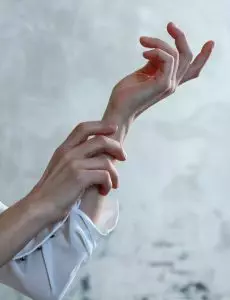
Itchy skin, dry skin irritation, or skin rash? Dermatitis is a broad term that covers many skin problems, including eczema, heat rash, diaper rash, and other kinds of skin allergy. Acupuncture and TCM offer a way to treat dermatitis, eczema, and itchy skin conditions.
The medical term “dermatitis” can refer to many types of skin irritation that involve inflammation. Inflamed skin can cause itching, redness, dryness, and rashes. A dermatitis itchy skin rash is caused by an inflammatory response related to the immune system.
Eczema, also known as atopic dermatitis, is a common inflammatory skin condition; over 30 million people in the U.S. have some type of eczema. Eczema can show up as early as a few weeks after birth in some babies, or during childhood, or during adulthood.
While what exactly causes atopic dermatitis to occur in some people is not completely understood, it is generally accepted that it is a combination of genetic, immunological, and environmental factors.
Dermatitis is not contagious; it is not passed from person to person. However, you are more likely to be susceptible to dermatitis or eczema if other people in your family have it, or if there is a family history of allergies and asthma.
Eczema and other forms of dermatitis tend to “flare up” when a person is exposed to some sort of trigger and has an allergic reaction. This could be due to something in the environment, or some product or plant that touched the person’s skin. It can also be due to internal causes, like an autoimmune problem, excess heat in the body, or emotional stress.
Signs of Dermatitis:
- Itchy dry skin rash skin irritations (pruritus)
- Red rash, red bumps on skin
- Rash like a burn
- Blisters
- Thick skin, hard skin, swelling
- Scaly skin, creasing skin
- Crusty sores, painful skin sores
- Bleeding rash, oozing skin rash
- Flaking skin (dandruff)
Symptoms of dermatitis can come and go. Scratching at itchy patches or blisters associated with dermatitis can cause a skin infection, so it is important to manage and control this condition.
Acupuncture and TCM herbs can help relieve itchy skin and inflammation, while also helping to balance the immune system to prevent further eczema flare ups.
Top 10 Types of Dermatitis
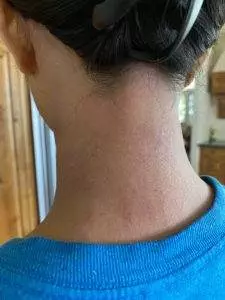
Many different conditions can cause dermatitis—meaning, inflammation of the skin. Different kinds of dermatitis include:
- Atopic dermatitis – also known as eczema, marked by dry, itchy, red patches of skin.
- Contact dermatitis – this is when a skin rash breaks out due to exposure to some kind of external irritant, such as a cosmetic product, piece of jewelry, or plant like poison ivy.
- Seborrheic dermatitis – flaking skin, also known as dandruff, occurs mostly on oily areas of the skin.
- Dyshidrotic dermatitis – (also called dyshidrotic eczema or pompholyx) small, itchy, fluid-filled blisters that appear on the soles of the feet or palms of the hands, or the tips of the fingers or toes. The blisters may break out due to exposure to an allergen or when hands and feet are often wet or sweaty.
- Diaper rash – a red rash that forms on a baby’s bottom or perineal area due to contact with the diaper and frequent wetness.
- Neurodermatitis – (also called lichen simplex chronicus) is a type of eczema marked by one or two very itchy, scaly patches that can become thickened and leathery – most often affects an area on the neck, ankle, arm, or groin. Neurodermatitis can itch so intensely that it affects a person’s sleep, and can be triggered by stressful events.
- Nummular dermatitis – (also known as discoid eczema) is marked by round, coin-shaped lesions that appear on the limbs or torso. These lesions can become infected with scratching, and may be related to poor circulation.
- Perioral dermatitis or Periorificial dermatitis – pink scaly patches or pustules that form around the mouth. This occurs more commonly in young women. Some doctors believe it may be related to candida, and/or influenced by hormones.
- Stasis dermatitis – (also called venous stasis dermatitis) itchy, scaly, discolored skin around the lower legs and ankles, due to poor circulation and blood pooling in the lower extremities.
- Dermatitis herpetiformis – a bumpy, blistered skin rash (looks similar to a herpes outbreak, but is not actually related to herpes simplex) that is related to celiac disease, triggered by ingesting gluten or wheat.
Psoriasis can look similar to eczema, but it is a separate condition that can coexist with various types of dermatitis. Rosacea redness can also look similar to dermatitis, but is a distinctly different condition that can occur at the same time as dermatitis.
What Causes Dermatitis?
A combination of the immune system reacting to irritants in the environment, and genetic predisposition.
Common environmental factors that can contribute to dermatitis include:
- Chemicals
- Air pollutants
- Fluoride in water or toothpaste
- Fragrances, perfumes, air freshener
- Fragrances in skin products, cosmetics, lotions, soaps
- Tobacco smoke
Other conditions that may occur simultaneously with dermatitis include: depression, anxiety, insomnia, allergies, and asthma.
Eczema Treatment
There are many different types of medical treatment for dermatitis. Some are topical—meaning, applied to the skin. Others are taken in an oral pill form, or injected into the skin.
Topical corticosteroid creams, which can help reduce skin inflammation, are the most common treatment for eczema and dermatitis. These can help reduce itching and swelling. However, prolonged use of topical steroids can cause side effects like thin skin, spider veins, and acne. Steroids can affect growth in children, and can cause eye problems like glaucoma or cataracts in older people.
Steroids that are taken orally, like Prednisone, can help control systemic inflammation for a time, while patches of scaly skin heal. However, there are many serious side effects associated with taking steroids for a long time, and it is also possible to experience a “rebound effect.” This means that the dermatitis symptoms come back even stronger when a person stops taking the steroid medications.
Calineuron inhibitors and JAK inhibitors are designed to stop certain chemical processes in the body related to immune responses. They can help block immune system reactions to calm the dermatitis skin problems.
There are many new types of treatment for eczema being developed. Phototherapy, or light therapy, using ultraviolet (UV) light, may be tried when topical treatments are not working for eczema that is widespread over the whole body. However, this kind of therapy can cause prematurely aging skin, changing skin pigmentation, and potentially increase the risk of skin cancer.
Acupuncture and TCM herbal supplements offer a way to treat eczema without any damaging side effects.
Can Acupuncture Help Dermatitis and Eczema?
One of the core concepts of TCM is the 5 Elements Theory, according to which organs of the body correspond with seasons and weather conditions. According to this theory, eczema and other kinds of dermatitis arise due to imbalances within the internal organ systems affected by external conditions, such as Wind and Heat.
The lungs, especially, are connected to the skin in the TCM system. The lungs can be affected by excess heat or stagnation in the liver. Thus, an itchy red rash on the skin is actually an expression of a deeper, more complex internal condition. Therefore, it is necessary to treat dermatitis and eczema not only with topical creams, but to use acupuncture and herbs to balance all of the organ systems.
The acupuncturist gets clues about which internal organs are out of harmony by observing the eczema symptoms: the type of rash or scaly skin, the color and temperature. Each individual case of dermatitis is unique, triggered by different irritants, and arising from a person’s overall state of health.
One study showed that acupuncture treatment worked better than antihistamines for helping to reduce the itchiness of atopic dermatitis pruritus. Acupuncture also helps to reduce inflammation and overall stress.
Studies done in China to determine the efficacy of an herbal formulation developed for eczema showed that it worked well to reduce itching and recurrence of rash.
As systematic review of over 350 studies on acupuncture for eczema showed the patients who were given acupuncture treatment instead of conventional treatment experienced better overall symptom reduction and quality of life.
Top 5 Tips to Prevent Dermatitis Itchy Skin

There are things you can do to help prevent eczema flare-ups from occurring and avoid recurrent rashes.
- Do not bathe in very hot water.
- Keep showers short and warm, and use gentle cleansers, without strong chemical perfumes.
- Do not scrub your skin during or after the shower, while drying. Pat gently.
- Use moisturizer frequently to maintain a protective layer on your skin.
- Wear long pants and sleeves when hiking and adventuring. Wear gloves when gardening.
Acupuncture Near Me for Dermatitis in Los Angeles and Santa Monica
Acupuncture can help relieve itching, aid in the healing of lesions, help stimulate healthier immune responses, and reduce stress. TCM treatment can also be sought as a safe treatment for children with eczema, or during pregnancy, as it is free of negative side effects.
TCM can also help patients with other skin conditions, including signs of aging, acne, hives (urticaria), rosacea, vitiligo, and psoriasis.
*This article is for education from the perspective of Traditional Chinese Medicine only. The education provided by this article is not approved by FDA to diagnose, prevent, treat and cure human diseases. It should not stop you from consulting with your physician for your medical conditions. Traditional Chinese Medicine is based on Qi, which is an invisible force that usually cannot be observed by modern science. Because science focuses on testing ideas about the natural world with evidence obtained through observation, these aspects of acupuncture can’t be studied by science. Therefore acupuncture and Chinese herbs are often not supported by double-blind, randomized trials, and they are considered alternative medicine therapies in the United States.
How to Treat Bronchitis With Acupuncture and TCM
By Xiaomei Cai, L.Ac., Ph.D. & Qineng Tan, L.Ac., Ph.D.

Chest cold with a productive cough, shortness of breath, coughing up mucus? These could be acute bronchitis symptoms. Acupuncture and TCM herbs can provide an alternative bronchitis treatment to help relieve chest congestion and a chronic cough.
Bronchitis is a respiratory infection in which the bronchial tubes, or airways, become inflamed. It typically causes chest congestion, a wet cough, coughing up phlegm, and difficulty breathing. Acute bronchitis usually develops due to the same kinds of viral infections that cause the common cold or pneumonia.
Chronic bronchitis refers to long-term inflammation of the lungs and bronchial tubes that is not related to an infection. If a person has a cough with mucus that lasts for months, or happens year after year, it is considered chronic bronchitis. This can happen as a result of smoking, and/or exposure to air pollution.
Like emphysema, chronic bronchitis is considered a chronic obstructive pulmonary disease (COPD). There are other lung conditions that can cause symptoms similar to those of bronchitis, including: asthma, sinusitis, whooping cough (pertussis) and tuberculosis.
Acute bronchitis usually clears up within a few weeks, but the persistent cough may linger. Antibiotics do not help treat viral infections, so the treatment for bronchitis is usually just to help suppress the cough and reduce aches and pains.
TCM treatment with acupuncture and herbs can help relieve bronchitis symptoms without side effects. It can also help remove pathogens and blockages affecting the lungs, so that bronchitis doesn’t turn into a chronic, recurrent condition.
Bronchitis Symptoms

Acute bronchitis causes the airways of the lungs—the bronchial tubes—to swell, and the lungs to produce extra mucus. Coughing, with clear or yellowish phlegm, is the primary symptom of bronchitis.
The most commons symptoms of bronchitis include:
- Cough, phlegmy cough, cough with mucus, productive cough, persistent cough
- Chest soreness, tightness in chest, chest pain
- Fatigue, feeling tired
- Shortness of breath, trouble breathing, wheezing
- Sore throat
- Stuffy nose, runny nose
- Body ache, headache, back pain, muscle pain
- Low grade fever
Is bronchitis contagious? It is not so much bronchitis as a condition—that is, inflammation and congestion in the lungs—is contagious, as the virus or bacterial infection that caused bronchitis to develop is contagious for a period of time. The coughing may last for a while beyond the infectious period. Sleeping can be difficult, because the cough tends to worsen when a person lies down.
Bronchitis Treatment
When you seek treatment for acute bronchitis from a physician, it is generally treated in the same way as the common cold. Recommendations will include:
- Rest
- Increase fluid intake, drink more water
- Take OTC pain relievers
- Take expectorants or cough suppressants to manage coughing
- Use a humidifier or sit in a steamy shower room to help relieve congestion
These remedies may help to temporarily relieve symptoms while a person gets over the infection. However, some of these medications can cause side effects, and they do not do much to help prevent bronchitis from coming back the next time a virus is going around.
Chronic bronchitis, as a COPD, is considered a chronic illness that must be managed, so as to slow its progression. Quitting smoking is the first recommendation. Then, bronchodilators, steroids, and/or antibiotics may be prescribed to help open the airways, reduce inflammation, and prevent recurrent infections.
These medical interventions, too, can come with significant side effects. Corticosteroids, in particular, if taken over a long period of time, can cause liver damage.
Making a major lifestyle change, like getting rid of a nicotine addiction, is easier said than done.
Fortunately, acupuncture and TCM herbs offer a complementary medicine to help relieve bronchitis symptoms, treat the deeper root causes, and also help with quitting smoking, if necessary.
Can Acupuncture Help Bronchitis?

According to TCM theory, bronchitis is the result of pathogenic forces like Wind and Dampness affecting the lungs and other organs systems that are interrelated. An acupuncturist looks for the particular patterns of symptoms in each individual, and tailors acupuncture treatment and herbal supplements, according to which organ system patterns are involved. These may include:
- Lung dampness
- Lung deficiency
- Lung dryness
- Phlegm-heat obstructing lung
- Wind invasion
- Spleen Qi deficiency
- Spleen/Kidney Yang deficiency
- Qi and/or Yin deficiency
Multiple studies have shown that acupuncture treatment and herbal cough preparations can be even more effective than conventional medicines when helping to relieve post-infectious chronic coughing.
Studies have shown that acupuncture can help reduce bronchial inflammation and damage, relieve coughing and reduce phlegm production. It can also help boost immune function.
One study detailed how patients with chronic bronchitis, who had been taking steroids for years, were able to reduce or entirely stop their use of steroids after receiving acupuncture treatments for a few months.
Chinese herbs, used in combination, can help relieve bronchitis symptoms and work on other levels, too. They can help clear toxins from the tissues and promote regeneration of new, healthy tissue, and improve immunity, so that the next time a virus is going around, the body is better equipped to fight it off quickly.
Top 5 Tips for Getting Rid of Bronchitis Naturally

Getting acupuncture treatment and specific herbs for your condition will be helpful. In addition, you can help strengthen your lung health by practicing these habits:
- Avoid dairy products, which increase mucus production
- Drink warm herbal teas, fresh ginger tea, and lemon water to help stay hydrated and thin phlegm. Avoid caffeine and alcohol, which dehydrate you. Ginger helps reduce inflammation.
- Steam an asian pear until very soft, and eat like applesauce. This helps clear mucus.
- Breathing exercises can be helpful; ask your acupuncture practitioner to show you some good breathing techniques.
- Take Yin Qiao pills at the very first sign of a cough or sore throat. This is a traditional Chinese formulation that helps ward off colds and coughs if taken early.
Acupuncture Near Me for Bronchitis in West Los Angeles
When a respiratory infection turns into a nagging cough, or worse, into chronic bronchitis that keeps coming back, year after year, it is important to seek treatment. With acupuncture and TCM herbs, it is possible to recover from a bronchial infection more quickly and comfortably. With regular acupuncture “tune-ups,” you can end the cycle of a chronic cough.
*This article is for education from the perspective of Traditional Chinese Medicine only. The education provided by this article is not approved by FDA to diagnose, prevent, treat and cure human diseases. It should not stop you from consulting with your physician for your medical conditions. Traditional Chinese Medicine is based on Qi, which is an invisible force that usually cannot be observed by modern science. Because science focuses on testing ideas about the natural world with evidence obtained through observation, these aspects of acupuncture can’t be studied by science. Therefore acupuncture and Chinese herbs are often not supported by double-blind, randomized trials, and they are considered alternative medicine therapies in the United States.
How to Treat Encephalitis With Acupuncture and TCM
By Xiaomei Cai, L.Ac., Ph.D. & Qineng Tan, L.Ac., Ph.D.
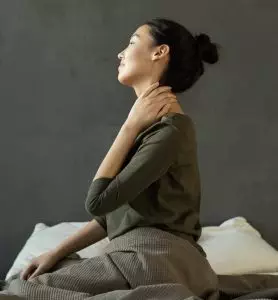
Headache, sensitivity to light, stiff neck, short-term memory loss? These could be signs of encephalitis, or inflammation in the brain. Infectious encephalitis can happen due to an infection; autoimmune encephalitis (AIE) is a type of autoimmune disorder. Acupuncture and TCM offer an adjunct treatment for encephalitis recovery.
What is encephalitis? Encephalitis refers to a serious condition in which the tissues of the brain become inflamed. It can happen to anyone, but is more common among children and older people.
The symptoms of encephalitis are sometimes ignored, because headaches, neck pain, and “brain fog” are so common and may not seem that serious at first. However, in combination, these signs should not be taken lightly. Like meningitis (inflammation of the membrane surrounding the brain and spinal cord), encephalitis can cause serious complications if left untreated. Encephalitis needs to be caught early and treated in order for people to make a full recovery.
What causes encephalitis? Brain inflammation can be caused by the body’s immune response to an infection, or due to an autoimmune disorder, in which the body produces antibodies that attack the brain tissues.
Top 10 Causes of Encephalitis
Viral infections are the primary reason that people develop encephalitis. These could be viruses carried by insects, especially mosquitoes, which are then contracted by humans through bites. Other communicable viral infections that pass from person to person through bodily fluids or close contact can also cause infectious encephalitis.
Infections that can lead to encephalitis include:
- Mosquito-borne viruses such as: West Nile Virus, Eastern Equine encephalitis, Western Equine encephalitis, St. Louis encephalitis, LaCrosse encephalitis
- Tick-borne viruses
- Rabies virus – can be contracted through being bitten by an infected animal
- Polio virus
- Herpes Simplex, Type 1 and Type 2 (HPV1 and HPV2)
- Epstein-Barr virus (mono, mononucleosis)
- Varicella Oster virus (chicken pox, shingles)
- Measles (rubeola)
- German measles (rubella)
- Mumps
There have been cases of people developing encephalitis as a complication of a COVID-19 infection.
Some cases of encephalitis can be caused by bacterial or fungal infections, or by a parasite. It could also be caused by exposure to some sort of allergen or toxin in the environment.
People with weakened immune systems—for example, due to HIV/AIDs—or who take immunosuppressant medications are at a higher risk for developing encephalitis.
Immunotherapy used to treat certain kinds of cancer, such as melanoma, ovarian cancer or lung cancer, has been shown to cause encephalitis in some cases.
Some cases of autoimmune encephalitis, called Anti-NMDAR encephalitis, appear to be related to a certain kind of tumor called a teteroma. In women and young women, especially, this can be an ovarian tumor that produces the antibodies for NMDAR.
Symptoms of Encephalitis
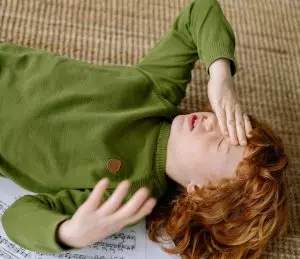
A mild case of encephalitis might only cause some flu-like symptoms that clear up within a few weeks. These types of symptoms include:
- Headache
- Stiff neck, neck pain
- Muscle aches, joint pain
- Fever
- Fatigue, feeling tired and weak
- Sensitivity to light
More severe symptoms of encephalitis can affect both cognitive and motor function:
- Mental confusion, brain fog, difficulty concentrating
- Memory problems, short term memory loss
- Hallucinations
- Seizures
- Severe headache
- Trouble with coordination or balance
- Loss of sensations in parts of the body or face
- Loss of muscle control in parts of the body or face
- Problems with speaking or hearing
- Mood swings, changes in personality
Anti-NMDAR encephalitis (when there may be an ovarian tumor involved, especially) can cause symptoms like pro-domal headache, nausea, and fever, which may then progress to more severe complications, including involuntary movements or tremors, urinary incontinence, rapid heartbeat, and psychiatric symptoms like anxiety, paranoia, or mania.
In severe cases, encephalitis can cause loss of consciousness and even cause a person to go into a coma. It is very important to seek urgent medical attention if you experience any of these symptoms.
Treatment for Encephalitis

Blood tests can confirm whether a viral or bacterial infection is causing encephalitis. Imaging tests like an MRI or CT scan may show the inflammation in the brain. A spinal tap may show an imbalance in cerebral fluids, or an EEG may show unusual electrical impulses in the brain.
However, there are times when these tests will not show exactly what is causing the encephalitis. As with many autoimmune disorders, it can be hard to pinpoint a clear diagnosis for autoimmune encephalitis (AIE).
Medical treatment for encephalitis will depend on what type it is determined to be. Mild inflammation will usually be treated with over the counter anti-inflammatory medications. Antivirals or antibiotics will be prescribed if a specific infection is found to be the cause. Steroids will often be used to help reduce inflammation. In more serious cases, a person may require breathing assistance or anti-seizure medications.
In cases where the cause is believed to be an autoimmune response, immunotherapy is used to try to interfere with the antibodies that are attacking the brain tissues. Steroids will be usually used in combination with other treatments. Plasmapheresis, or plasma exchange, removes some of these antibodies from the blood. Intravenous immunoglobulin therapy introduces healthy antibodies to block the action of the malfunctioning antibodies.
In cases of anti-NMDAR encephalitis where a tumor is present, treatment will include the removal of the tumor in addition to immunotherapy. Patients with this type of encephalitis may also be prescribed antipsychotic drugs to relieve psychiatric symptoms.
Immunotherapy works for some patients, but not all. Many patients will be offered second-line treatments such as monoclonal antibodies or antimetabolites. In some cases, people may seem to recover from encephalitis for a while, and then have a relapse in which the inflammation flares up again.
Most people will need significant time and rehabilitation to help them make a full recovery from encephalitis. Some people will have long-lasting effects, such as memory problems, balance and coordination issues, speech problems, and emotional volatility.
Many of the pharmaceutical treatments available for encephalitis cause significant side effects and can even lead to more physical, emotional and mental health issues. Fortunately, acupuncture and other TCM modalities offer a way to reduce inflammation in the brain and help relieve encephalitis, as well as helping to offset any side effects from other medical interventions.
Can Acupuncture Help Encephalitis?

With acupuncture and Chinese herbs, we seek to treat the root cause and the various symptoms and complications of each condition according to recognizable patterns. This allows us to effectively treat some conditions, such as autoimmune diseases, neurological disorders, and inflammatory conditions that may not readily respond to conventional medicine.
In the TCM view, inflammation occurs because there is too much heat in the body. Yang energy provides the “fire” we need to keep the body warm and energetic. But, if there is an imbalance, and too much heat, this leads to conditions like fever, infections, and inflammation. So, we see pathogenic internal heat as contributing to encephalitis, in addition to outside pathogens like viruses or bacteria. To clear heat that is trapped or stagnant in the body, we will use specific herbs and cooling foods, along with acupuncture treatment and lifestyle changes to reduce physical and mental stress. TCM herbs can also be highly effective against bacterial and viral infections.
The motor control and cognitive problems that can result from encephalitis occur because the inflammation in the brain is affecting the functioning of the central nervous system. With acupuncture, we can help to reestablish connections and neural pathways.
Autoimmune disorders are still not well understood by Western medicine, but with acupuncture we can help to balance and regulate the immune system, so that it is not being inappropriately triggered. This is why acupuncture works well as an adjunct treatment for encephalitis and many other autoimmune disorders.
Acupuncture Near Me for Encephalitis in Los Angeles and West Los Angeles
It can be very difficult when you or someone you love is facing a serious illness and a long, difficult recovery. TCM offers a healthcare option that treats each person in a highly individualized and caring way. At Art of Wellness, we have over 30 years of experience helping people gain back their strength and mobility after suffering from conditions like encephalitis, meningitis, Lyme disease, Guillain Barré Syndrome, Myasthenia Gravis, and many others.
*This article is for education from the perspective of Traditional Chinese Medicine only. The education provided by this article is not approved by FDA to diagnose, prevent, treat and cure human diseases. It should not stop you from consulting with your physician for your medical conditions. Traditional Chinese Medicine is based on Qi, which is an invisible force that usually cannot be observed by modern science. Because science focuses on testing ideas about the natural world with evidence obtained through observation, these aspects of acupuncture can’t be studied by science. Therefore acupuncture and Chinese herbs are often not supported by double-blind, randomized trials, and they are considered alternative medicine therapies in the United States.